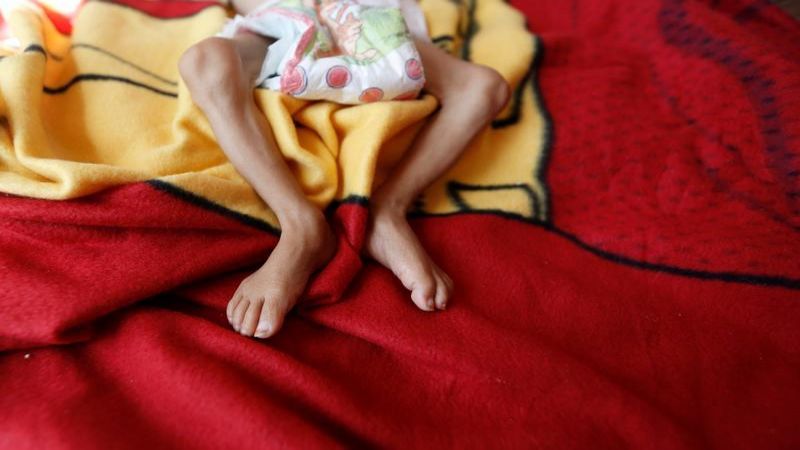
Local Editor
The Saudi-led coalition’s broad restrictions on aid and essential goods to Yemen’s civilian population are worsening the country’s humanitarian catastrophe, Human Rights Watch said Thursday. Unless the coalition immediately stops blocking aid and commercial goods from reaching civilians in Houthi-controlled territory, the United Nations Security Council should impose travel bans and asset freezes on senior coalition leaders, including the Saudi crown prince and defense minister, Mohammed bin Salman.
The coalition has imposed a naval and air blockade on Yemen since the current conflict began in March 2015 that has severely restricted the flow of food, fuel, and medicine to civilians, in violation of international humanitarian law. The coalition closed all of Yemen’s entry points on November 4th. While the coalition eased some restrictions in late November, it continues to prevent much aid and nearly all commercial imports from reaching Houthi-controlled ports, which has an unlawfully disproportionate impact on civilians’ access to essential goods.
“The Saudi-led coalition’s military strategy in Yemen has been increasingly built around preventing desperately needed aid and essential goods from reaching civilians, risking millions of lives,” said James Ross, legal and policy director at Human Rights Watch. “The Security Council should urgently sanction Saudi and other coalition leaders responsible for blocking food, fuel, and medicine, causing hunger, sickness, and death.”
Yemen, the poorest country in the Middle East, depends heavily on imported food, medicine, and fuel for 80 to 90 percent of the population’s needs. As of November, seven million people were dependent on food aid to survive, and nearly a million may have cholera. Diphtheria, a disease that should be preventable, was spreading, and had already killed more than 20 people and infected nearly 200. An estimated 2 million children are acutely malnourished. Half the country’s hospitals have been closed and nearly 16 million people lack access to clean water.
Reopening all of Yemen’s land, air, and sea ports to commercial shipments, which before November made up 80 percent of all imports, is crucial to any effort to address what the UN has described as the world’s “worst humanitarian crisis,” Human Rights Watch said.
Claiming a need to strengthen vetting procedures, the coalition halted all humanitarian flights and shipments to Yemen for several days following the November 4 attack and halted all humanitarian flights and shipments to ports in Houthi controlled territory for about three weeks. On November 22, the coalition announced that it would allow humanitarian flights to resume to the capital, Sana’a, and “urgent humanitarian and relief materials” to begin moving to the Houthi-controlled port of Hodeida.
Major restrictions on the delivery of essential goods to the civilian population remain, Human Rights Watch said. While a limited number of food shipments have reached Houthi-Saleh ports on an ad hoc basis since November 22, the coalition has not indicated whether it will allow seaports under Houthi-Saleh control to reopen to commercial shipments, including fuel and medicine. The World Food Program estimated that even with a partial lifting of the blockade, an additional 3.2 million people would be pushed into hunger and 150,000 malnourished children could die in the coming months.
On December 2, the heads of seven humanitarian agencies issued a joint statement calling on the coalition to lift restrictions: “Without the urgent resumption of commercial imports, especially food, fuel and medicines, millions of children, women and men risk mass hunger, disease and death,” they said.
Coalition military actions have violated laws-of-war prohibitions on restricting humanitarian assistance and on destroying objects essential to the survival of the civilian population. These violations, as well as the coalition’s disregard for the reported suffering of the civilian population, suggest that the coalition may also be violating the prohibition against using starvation as a method of warfare, which is a war crime.
The UN Security Council should impose a travel ban and asset freeze on senior leaders of the coalition, including Mohamed bin Salman, for their role in violations of international humanitarian law in Yemen, Human Rights Watch said. Under Security Council Resolution 2216, the Yemen Sanctions Committee can designate “individuals or entities” for targeted sanctions if they are “engaging in or providing support for” acts that “[obstruct] the delivery of humanitarian assistance to Yemen or access to, or distribution of, humanitarian assistance in Yemen.”
The Sanctions Committee has already imposed sanctions – including asset freezes and travel bans – on five leaders of formerly allied Houthi-Saleh forces, including Saleh. No one from the coalition has been designated for sanctions, despite information on repeated coalition violations, including the obstruction of aid, gathered by the UN Panel of Experts, which provides information on implementing the resolution.
“UN Security Council members, particularly the United States, United Kingdom, France, and other coalition allies, have shielded Saudi Arabia from serious international scrutiny even though the Saudi-led coalition has committed numerous atrocities in Yemen,” Ross said. “The Security Council urgently needs to act against coalition leaders who have added to Yemen’s humanitarian catastrophe or share in the blame.”
Source: HRW, Edited by Website Team